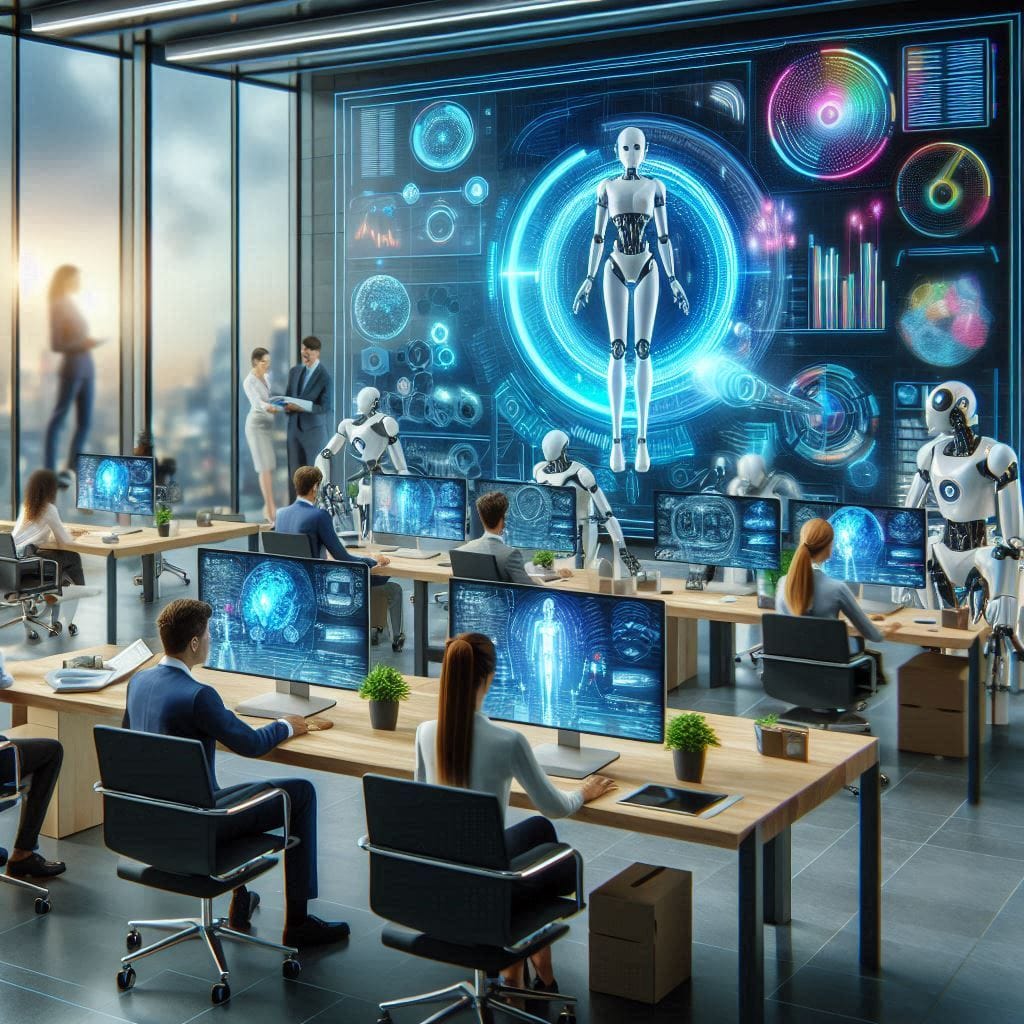The future of work is no longer a distant concept—it is unfolding before our eyes, driven by the rapid advancement of artificial intelligence (AI) and automation. Businesses across industries are witnessing a seismic shift in how work is done, with AI automation reshaping processes, roles, and competitive dynamics. The implications are profound, offering both challenges and opportunities for businesses, workers, and entrepreneurs alike. Here’s a deep dive into how AI automation is transforming the future of work and what it means for businesses.

1. The Transformation of Work
AI is not just another technological trend; it is a transformative force that is redefining the very nature of work. According to industry experts, up to 30% of current jobs could be automated by the mid-2030s, with AI taking over repetitive, rule-based tasks across sectors. However, this transformation is not solely about job displacement—it’s about evolution. As AI automates routine tasks, new roles and business models are emerging, centered around AI development, management, and integration.
This shift is creating a potential divide in the workforce. Those who master AI-related skills will thrive, leveraging AI to enhance productivity and innovation. On the other hand, workers who fail to adapt may struggle to remain relevant. For businesses, this means investing in upskilling employees and fostering a culture of continuous learning to bridge the gap.
2. AI Automation in Business: A Competitive Imperative
Businesses are increasingly turning to AI solutions to gain a competitive edge. From streamlining operations to enhancing customer experiences, AI is being deployed across a wide range of functions, including:
- Customer Service: AI-powered chatbots and voice agents are handling customer inquiries, providing 24/7 support, and improving response times.
- Sales and Marketing: AI is automating lead generation, personalizing outreach, and optimizing marketing campaigns.
- Content Creation: Tools like AI content repurposing systems and AI-enhanced writing platforms are maximizing content ROI and reducing production time.
- Recruitment and HR: AI is streamlining talent acquisition by automating resume screening and candidate matching.
- Internal Operations: AI co-pilots and workflow automation tools are enhancing productivity by handling repetitive tasks, allowing employees to focus on higher-value work.
The benefits of AI adoption are clear: scalability, cost savings, and improved efficiency. Even when AI performs at a slightly lower rate than human counterparts, its ability to operate around the clock and handle large volumes of work makes it a valuable asset. Businesses that delay adopting AI risk falling behind competitors who leverage these technologies to innovate and optimize.
3. Opportunities in the AI Space
The rise of AI is not just transforming existing businesses—it’s creating entirely new opportunities for entrepreneurs. The AI Automation Agency (AAA) model, for example, is emerging as a lucrative entry point for individuals and startups looking to offer AI solutions to businesses. These agencies specialize in implementing AI tools tailored to specific industries or functions, such as AI voice agents, chatbots, or workflow automation systems.
Specialization is key to success in the AI space. Entrepreneurs who focus on niche areas—such as AI for healthcare, finance, or e-commerce—can carve out a competitive advantage. Additionally, there is a growing demand for AI education and consulting, as many businesses are still grappling with how to effectively integrate AI into their operations.
4. The Skills for the Future
As AI reshapes the workforce, the skills required to succeed are evolving. The future belongs to AI generalists—individuals who can harness AI tools to perform the tasks of multiple specialists. Key skills for the AI-driven workplace include:
- AI-Assisted App Development: Building applications that integrate AI capabilities.
- Prompt Engineering: Crafting effective prompts to maximize the output of AI tools like ChatGPT.
- Workflow Automation: Designing and implementing automated processes to improve efficiency.
- API Integration: Connecting AI tools with existing systems and platforms.
- AI Content Generation and Editing: Using AI to create and refine content at scale.
For businesses, investing in these skills—whether through hiring or training—is essential to staying competitive. For workers, developing AI proficiency is no longer optional; it’s a necessity for career growth and job security.
5. The Current State of the Market
Despite the hype surrounding AI, the market is still in its early stages. Many businesses have yet to adopt AI solutions, creating a massive untapped opportunity for growth. However, confusion and uncertainty about how to effectively use AI remain significant barriers. This presents an opportunity for AI-focused businesses and educators to step in and guide organizations through the transition.
The interest in AI is undeniable, but the key to success lies in specialization, value creation, and adaptability. Businesses that can identify specific pain points and offer tailored AI solutions will be well-positioned to thrive in this rapidly evolving landscape.
Conclusion: Embracing the AI-Driven Future
The future of work is here, and it is inextricably linked to AI automation. For businesses, adopting AI is no longer a luxury—it’s a necessity for staying competitive in an increasingly digital world. Workers must embrace AI skills to remain relevant, while entrepreneurs have unprecedented opportunities to build AI-focused businesses and solutions.
The path forward requires a proactive approach: businesses must invest in AI adoption and employee upskilling, workers must commit to lifelong learning, and entrepreneurs must focus on delivering value in specialized niches. By embracing AI automation, businesses can unlock new levels of efficiency, innovation, and growth, ensuring they are not just surviving but thriving in the future of work.
The AI revolution is here—are you ready to seize its potential?

